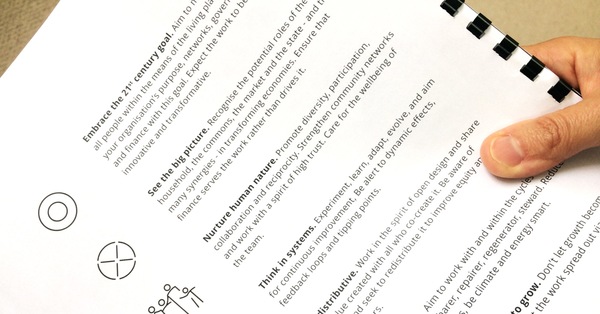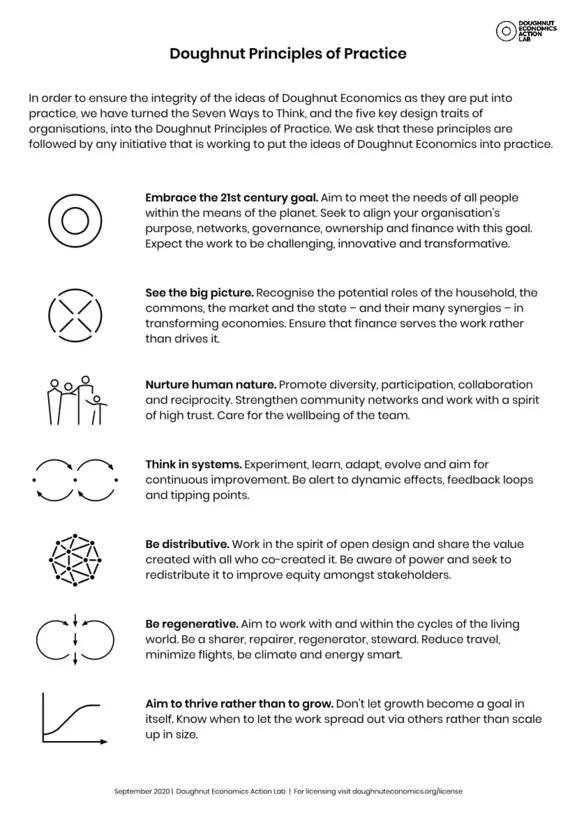
Doughnut Principles of Practice
A PDF of the Doughnut Principles of Practice ready to print

Version 1.0 (September 2020)
Overview
DEAL has developed a set of principles to guide our own evolution and our choice of collaborations. We ask that these principles are placed at the heart of any project and initiative that aims to put the ideas of Doughnut Economics into practice.
Share
Attachments
Tags
Share
-
Story

Vision for the Shropshire Hills in Doughnut form
We've used the doughnut model as the basis of a visual Vision for the Shropshire Hills National Landscape
-
Story

Introducing Doughnut Economics to Izmir, Türkiye
The Izmir Gevrek Model, aiming to live in a thriving, regenerative and inclusive Izmir
-
Story

Mexico City's International Donut Day 2023
About the First International Donut Day in Mexico City, going where the (sustainability) energy is.
-
Story

Bogotá-Building community-Schools and citizens
Last months in Bogotá we have been doing events with citizens and schools to put the doughnut teachings into practice.
-
Story

ChatGPT Meets Doughnut Economics
Designing Doughnut Products and Supply Chains Using Generative AI
-
Story

Innovating, Designing and Engineering Doughnuts
Design for Sustainability and Circularity Framework, Fit for the 21st Century
-
Story

One Small Town
Small Towns where business, community and commons are cooperatively owned
-
Story

TIME Magazine Special Issue on Countdown 2030
TIME Magazine 1 Feb 2021 special issue on Countdown 2030 - Why 2030?
-
Member

Rob Hart
Aldershot, England, United Kingdom
I head up the Corporate Responsibility team at a global law firm, and am eager to connect with this community for 2 reasons: I'm interested in building a sustainability strategy for my firm that's rooted in the Doughnut Economics model, and I'm eager to build a community of sustainability-minded people in my local area.
-
Member

Bruce Hey
Baardskeerdersbos, Western Cape, South Africa
I am an author who previously worked in the oil and gas industry and am now a sustainability activist. My first two books focus on the oil, gas and process industries where I outline what is required to enhance the performance of the managed assets. The second book dives into the management of turnarounds which is crucial for the long term success of the company. My third book explores the long term survival of businesses where they have to refocus on renewables to achieve net zero emissions by 2050. My overall focus is on the long term sustainability of businesses. The realignment of fossil fuel companies to become sustainable, using new technologies and ideas, is of particular interest to me. The phasing out of fossil fuels needs careful consideration to minimize the social and environmental impacts while ensuring an economically viable transition to net zero emissions.
-
Member


Kimberly Byrd
Minneapolis, Minnesota, United States of America
My enchantment and fascination with the natural world began early with a love of animals, who I saw as ambassadors for other worlds. When I was 17, an extended hiking trip in the Wind Rivers of Wyoming sealed the deal. I teach lecture-based and experiential learning courses on sustainability, environmental ethics, ecological integrity, resilience theory, environmental psychology, and transformational learning at various Universities in the Twin Cities. I live in Mahtomedi with my three delightful children and two overly enthusiastic dogs. I consider my house one big art project, and I love to cook and entertain. Curious minds are always welcome at my table. Come say hello!
-
Member

Myra Panjaitan
Banten, Indonesia
-
Member


Carla Robb
Utrecht, The Netherlands
I am an urban development specialist from South Africa. I am passionate about working with like-minded people to contribute to the creation of cities that provide equal opportunities for all, while developing sustainably, within the planetary boundaries. What really excites me about doughnut economics is the aim to tackle inequality while also dealing with climate change. It is difficult (potentially overwhelming) trying to deal with both pressing issues, and more often than not, they’re disconnected in implementation. I am excited about exploring the doughnut principles in more detail in the developing world/South African city context, where basic needs have not yet been met and poverty, inequality and unemployment are rife.
-
Member

Tarik Eddial
Zutphen, Gelderland, The Netherlands
-
Member

.jpg)
Shawna Snow
Amsterdam, Noord-Holland, The Netherlands
-
Member

Nicolas L
Bristol
